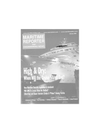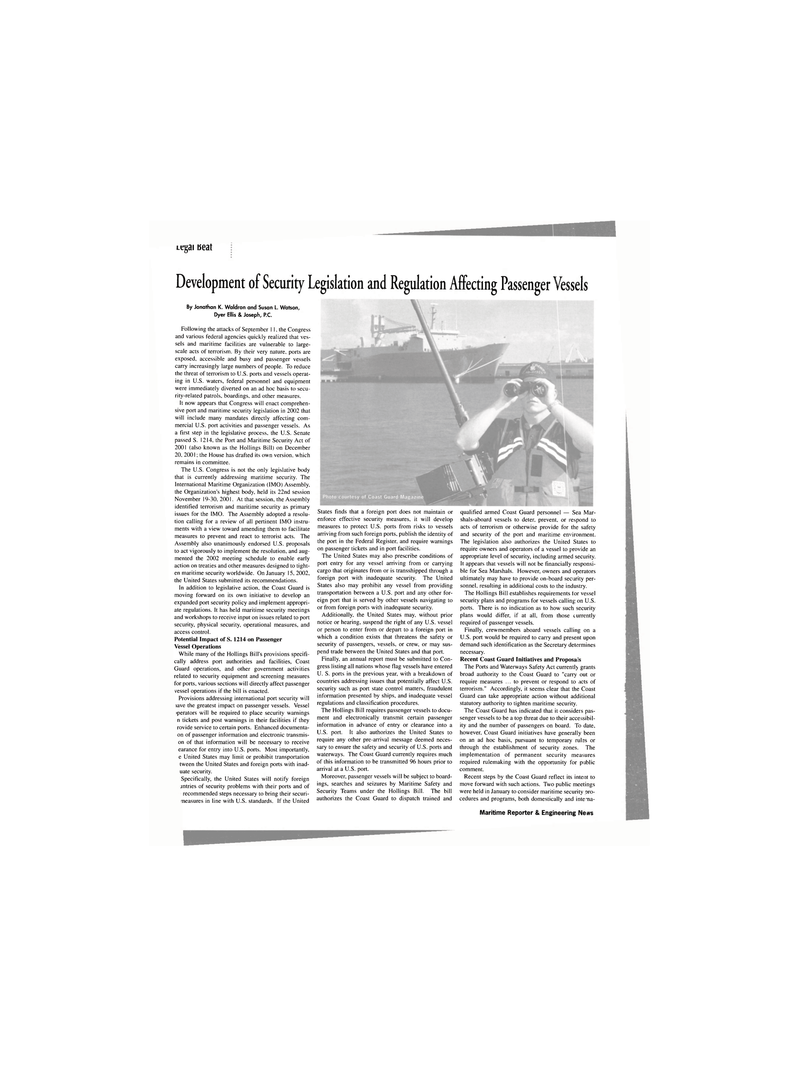
Page 10: of Maritime Reporter Magazine (February 2002)
Read this page in Pdf, Flash or Html5 edition of February 2002 Maritime Reporter Magazine
Legal Beat
Development of Security Legislation and Regulation Affecting Passenger Vessels
By Jonathan K. Waldron and Susan L. Watson,
Dyer Ellis & Joseph, P.C.
Following the attacks of September 11. the Congress and various federal agencies quickly realized that ves- sels and maritime facilities are vulnerable to large- scale acts of terrorism. By their very nature, ports are exposed, accessible and busy and passenger vessels carry increasingly large numbers of people. To reduce the threat of terrorism to U.S. ports and vessels operat- ing in U.S. waters, federal personnel and equipment were immediately diverted on an ad hoc basis to secu- rity-related patrols, boardings, and other measures.
It now appears that Congress will enact comprehen- sive port and maritime security legislation in 2002 that will include many mandates directly affecting com- mercial U.S. port activities and passenger vessels. As a first step in the legislative process, the U.S. Senate passed S. 1214, the Port and Maritime Security Act of 2001 (also known as the Hollings Bill) on December 20, 2001; the House has drafted its own version, which remains in committee.
The U.S. Congress is not the only legislative body that is currently addressing maritime security. The
International Maritime Organization (IMO) Assembly, the Organization's highest body, held its 22nd session
November 19-30, 2001. At that session, the Assembly identified terrorism and maritime security as primary issues for the IMO. The Assembly adopted a resolu- tion calling for a review of all pertinent IMO instru- ments with a view toward amending them to facilitate measures to prevent and react to terrorist acts. The
Assembly also unanimously endorsed U.S. proposals to act vigorously to implement the resolution, and aug- mented the 2002 meeting schedule to enable early action on treaties and other measures designed to tight- en maritime security worldwide. On January 15, 2002, the United States submitted its recommendations.
In addition to legislative action, the Coast Guard is moving forward on its own initiative to develop an expanded port security policy and implement appropri- ate regulations. It has held maritime security meetings and workshops to receive input on issues related to port security, physical security, operational measures, and access control.
Potential Impact of S. 1214 on Passenger
Vessel Operations
While many of the Hollings Bill's provisions specifi- cally address port authorities and facilities, Coast
Guard operations, and other government activities related to security equipment and screening measures for ports, various sections will directly affect passenger vessel operations if the bill is enacted.
Provisions addressing international port security will lave the greatest impact on passenger vessels. Vessel iperators will be required to place security warnings n tickets and post warnings in their facilities if they rovide service to certain ports. Enhanced documenta- on of passenger information and electronic transmis- on of that information will be necessary to receive earance for entry into U.S. ports. Most importantly, e United States may limit or prohibit transportation tween the United States and foreign ports with inad- uate security.
Specifically, the United States will notify foreign jntries of security problems with their ports and of recommended steps necessary to bring their securi- measures in line with U.S. standards. If the United
States finds that a foreign port does not maintain or enforce effective security measures, it will develop measures to protect U.S. ports from risks to vessels arriving from such foreign ports, publish the identity of the port in the Federal Register, and require warnings on passenger tickets and in port facilities.
The United States may also prescribe conditions of port entry for any vessel arriving from or carrying cargo that originates from or is transshipped through a foreign port with inadequate security. The United
States also may prohibit any vessel from providing transportation between a U.S. port and any other for- eign port that is served by other vessels navigating to or from foreign ports with inadequate security.
Additionally, the United States may, without prior notice or hearing, suspend the right of any U.S. vessel or person to enter from or depart to a foreign port in which a condition exists that threatens the safety or security of passengers, vessels, or crew, or may sus- pend trade between the United States and that port.
Finally, an annual report must be submitted to Con- gress listing all nations whose flag vessels have entered
U. S. ports in the previous year, with a breakdown of countries addressing issues that potentially affect U.S. security such as port state control matters, fraudulent information presented by ships, and inadequate vessel regulations and classification procedures.
The Hollings Bill requires passenger vessels to docu- ment and electronically transmit certain passenger information in advance of entry or clearance into a
U.S. port. It also authorizes the United States to require any other pre-arrival message deemed neces- sary to ensure the safety and security of U.S. ports and waterways. The Coast Guard currently requires much of this information to be transmitted 96 hours prior to arrival at a U.S. port.
Moreover, passenger vessels will be subject to board- ings, searches and seizures by Maritime Safety and
Security Teams under the Hollings Bill. The bill authorizes the Coast Guard to dispatch trained and qualified armed Coast Guard personnel — Sea Mar- shals-aboard vessels to deter, prevent, or respond to acts of terrorism or otherwise provide for the safety and security of the port and maritime environment.
The legislation also authorizes the United States to require owners and operators of a vessel to provide an appropriate level of security, including armed security.
It appears that vessels will not be financially responsi- ble for Sea Marshals. However, owners and operators ultimately may have to provide on-board security per- sonnel. resulting in additional costs to the industry.
The Hollings Bill establishes requirements tor vessel security plans and programs for vessels calling on U.S. ports. There is no indication as to how such security plans would differ, if at all, from those currently required of passenger vessels.
Finally, crewmembers aboard vessels calling on a
U.S. port would be required to carry and present upon demand such identification as the Secretary determines necessary.
Recent Coast Guard Initiatives and Proposals
The Ports and Waterways Safety Act currently grants broad authority to the Coast Guard to "carry out or require measures ... to prevent or respond to acts of terrorism." Accordingly, it seems clear that the Coast
Guard can take appropriate action without additional statutory authority to tighten maritime security.
The Coast Guard has indicated that it considers pas- senger vessels to be a top threat due to their accessibil- ity and the number of passengers on board. To date, however. Coast Guard initiatives have generally been on an ad hoc basis, pursuant to temporary rules or through the establishment of security zones. The implementation of permanent security measures required rulemaking with the opportunity for public comment.
Recent steps by the Coast Guard reflect its intent to move forward with such actions. Two public meetings were held in January to consider maritime security oro- cedures and programs, both domestically and intema- 12 Maritime Reporter & Engineering News

 9
9

 11
11
